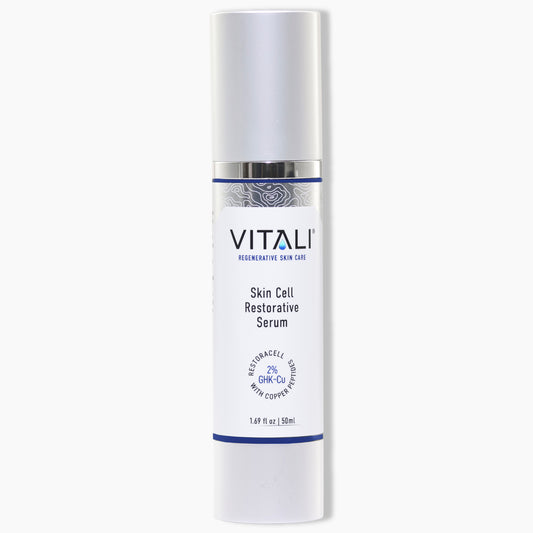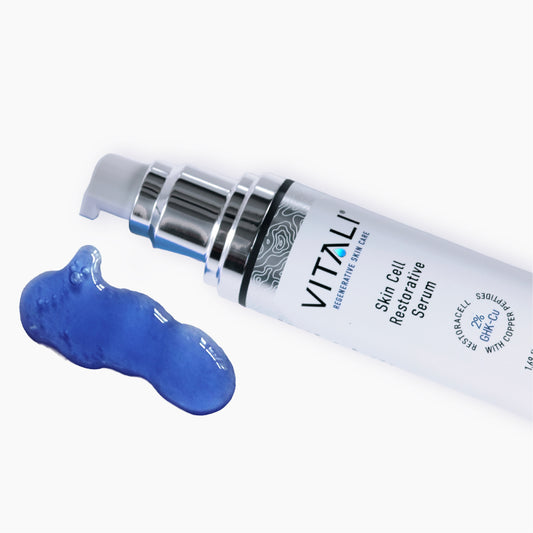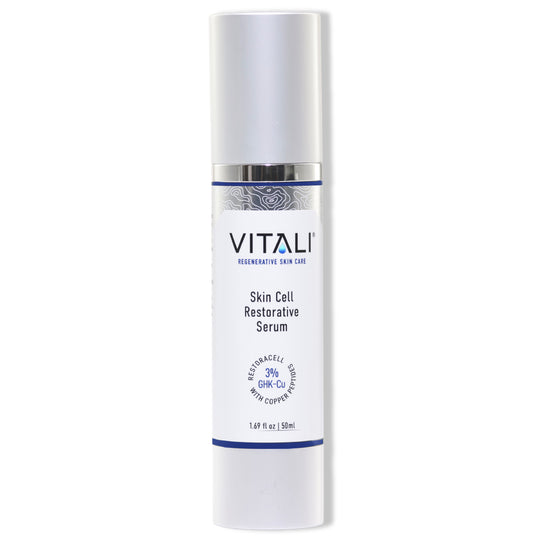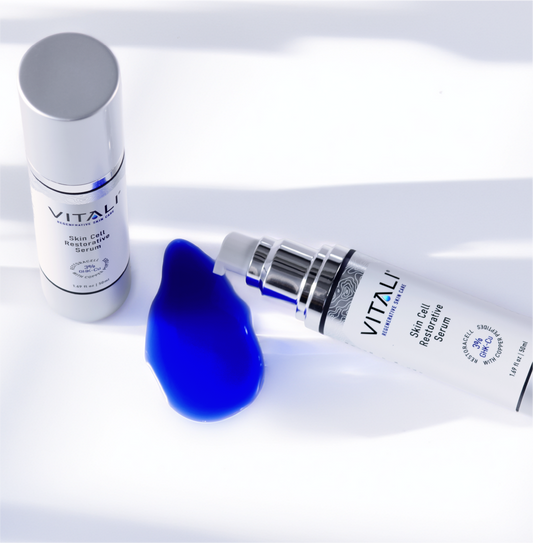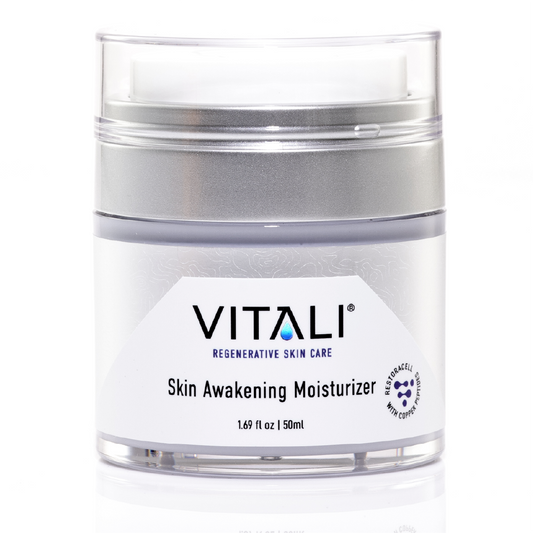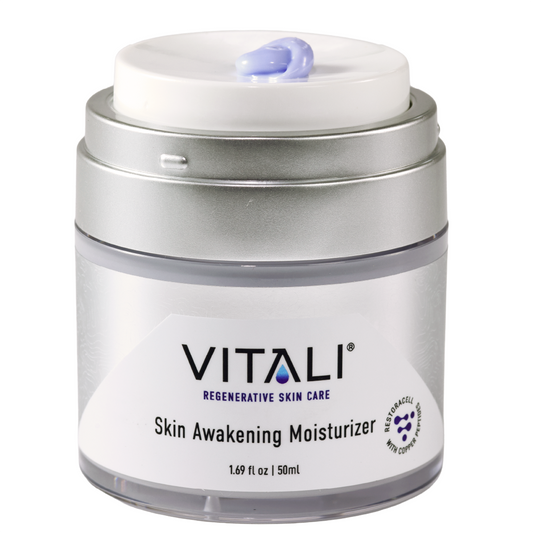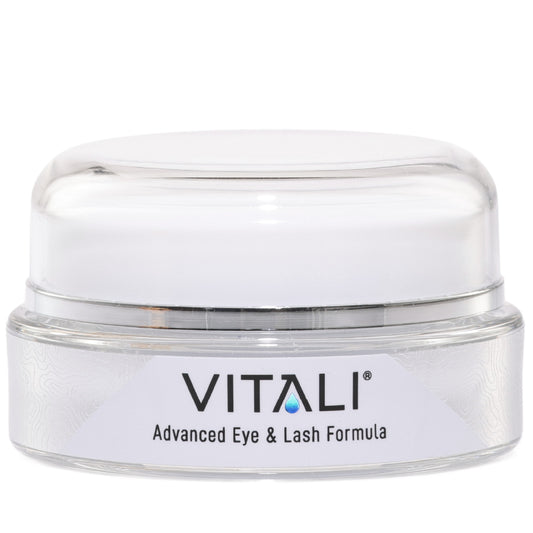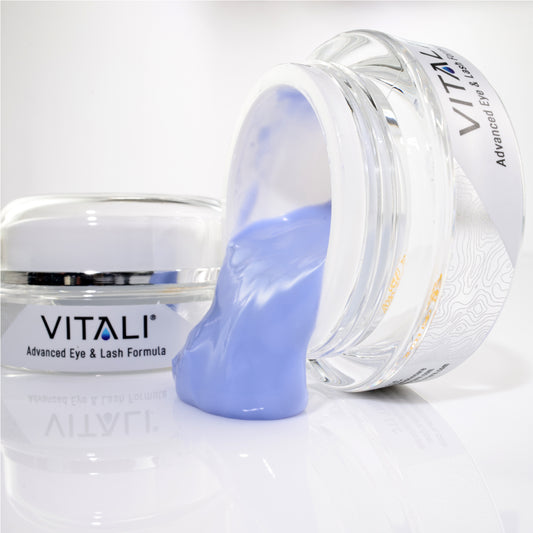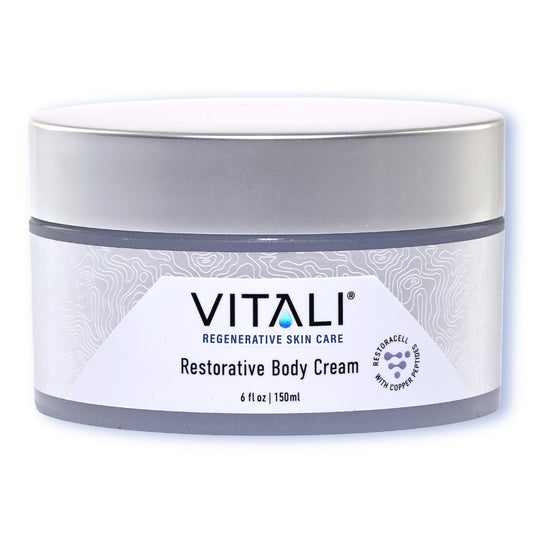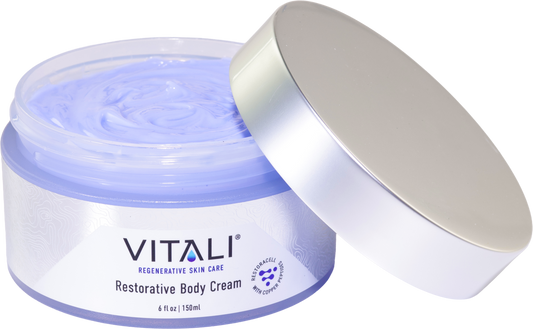Copper Peptide Skincare Collection
-
2% GHK-Cu Skin Cell Restorative Serum
Regular price $119.00Regular price -
3% GHK-Cu Skin Cell Restorative Serum (50% More GHK-Cu)
Regular price $189.00Regular price -
Skin Awakening Moisturizer
Regular price $99.00Regular price -
Advanced Eye & Lash Formula
Regular price $89.00Regular price$0.00Sale price $89.00 -
Restorative Body Cream
Regular price $94.50Regular price$0.00Sale price $94.50
Copper Peptide Skincare Collection
Revitalize your skin with Vitali’s Copper Peptide Skincare Collection. Featuring our Skin Cell Restorative Serums (2% & 3% GHK‑Cu), the Skin Awakening Moisturizer, Advanced Eye & Lash Formula, and Restorative Body Cream, each product is infused with potent GHK‑Cu copper peptides that work at the cellular level to support collagen, elastin, and skin repair.
Why GHK‑Cu Copper Peptides Matter
GHK‑Cu (glycyl‑L‑histidyl‑L‑lysine copper peptide) is a naturally occurring, blue-hued tripeptide that plays a key role in skin regeneration. It stimulates collagen and elastin production, increases hydration, encourages healthy skin turnover, calms visible irritation, and functions as an antioxidant. Together, these actions contribute to smoother, firmer, and more resilient skin.
Because GHK‑Cu helps transport copper ions into skin cells, it supports enzymatic repair functions and influences gene expression that is essential to maintaining healthy skin structure over time.
Its distinctive blue color reflects both its purity and the presence of active copper peptide complexes.
What Sets Vitali’s Formulas Apart
High purity and concentration: Vitali’s serums feature 2% and 3% GHK‑Cu alongside complementary ingredients like palmitoyl tripeptide, hyaluronic acid, and sea kelp to help support visible skin renewal.
- Ingredient-focused formulation: Each product is made without parabens, phthalates, synthetic fragrance, or artificial dyes. The focus remains on science-backed results and gentle, skin-compatible ingredients.
- Systematic routine approach: With options for face, eyes, lashes, and body, this collection allows for a consistent copper peptide regimen tailored to your skincare needs.
- Visible integrity: The natural blue tone of GHK‑Cu signals authenticity and reflects the quality of the active ingredient.
GHK-Cu Copper Peptide FAQs
What’s the difference between GHK-Cu and Copper Peptides?
GHK‑Cu is a specific copper peptide formed when the tripeptide GHK binds copper ions. It’s the most researched and widely used copper peptide. "Copper peptides" is a broader term that includes other less common variants like AHK‑Cu.
Is GHK-Cu better than retinol?
They work differently. While GHK‑Cu promotes cellular repair and collagen synthesis with minimal irritation, retinol speeds up cell turnover but can cause dryness or sensitivity. There aren’t direct clinical comparisons yet, so "better" depends on your skin goals and tolerance, but GHK-Cu is often used as an alternative to retinol.
How long does it take for GHK-Cu to work?
Studies show visible improvements in skin texture, density, firmness, and wrinkle reduction within 8–12 weeks. Some users report subtle changes after 4–8 weeks, but full effects often take a couple of months.
Is GHK-Cu safe for sensitive skin?
Yes, GHK-Cu is generally well tolerated and even soothing, thanks to its anti-inflammatory action. Rare irritation can occur, so patch testing first is a good idea.
Does GHK-Cu help with wrinkles or collagen?
Absolutely. It supports collagen and elastin production, strengthens skin structure, and reduces the depth and volume of wrinkles in controlled studies.
Can copper peptides reverse aging?
They can’t reverse aging entirely, but GHK‑Cu has been shown to improve signs of aging by boosting firmness, reducing hyperpigmentation, and promoting skin regeneration
What concentration of GHK-Cu is most effective?
Most products range between 0.05%–0.5%, with some research supporting up to 3% blends for facial use. Vitali offers both 2% and 3% GHK‑Cu serums, which fall at the high end of the spectrum to support visible improvements in tone, firmness, and elasticity while remaining well tolerated.
How does GHK-Cu affect your skin barrier?
GHK‑Cu supports skin barrier repair and has demonstrated antioxidant and anti-inflammatory benefits.
What’s the difference between GHK-Cu and NAD+ for skin?
GHK‑Cu is a topical regenerative copper peptide, promoting collagen and repair. NAD+ is a systemic coenzyme involved in cellular energy, DNA repair, and longevity, usually taken orally or via infusion. They support skin health through different mechanisms
What happens if you use too much GHK-Cu?
Topically, it’s well tolerated, but overuse may cause mild irritation or redness. Ingested or injected, excessive copper could pose health risks. Stick to labeled directions and patch test before use.
Is GHK-Cu better in serum or cream form?
Both work. Serums offer higher concentration and faster absorption, while creams provide nourishment and barrier support. Choose based on your skin’s needs (e.g., serum for targeted treatment, cream for hydration).

